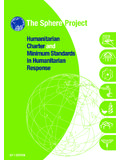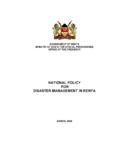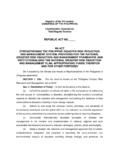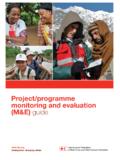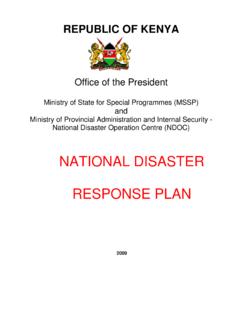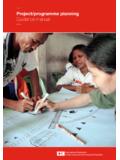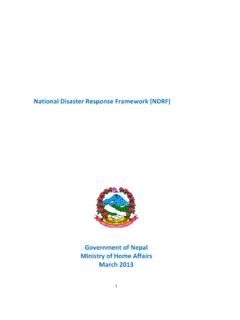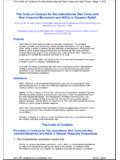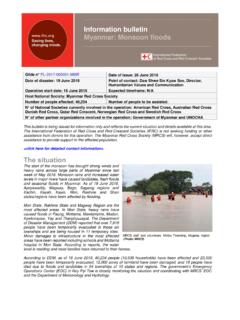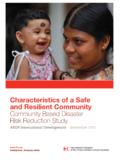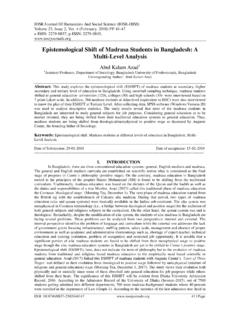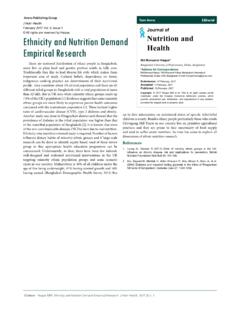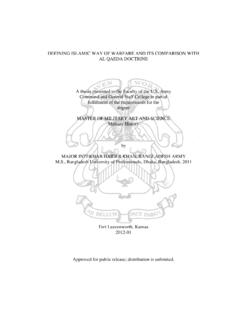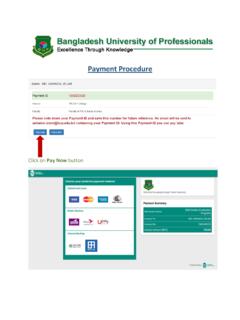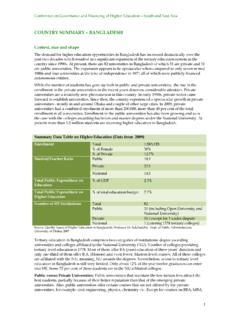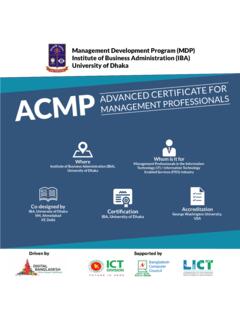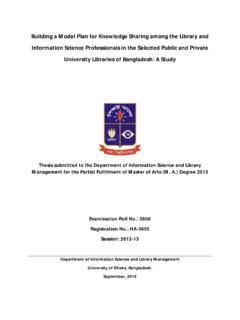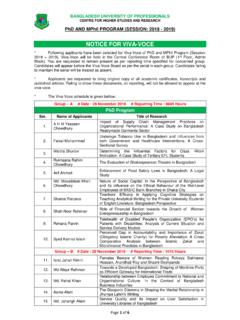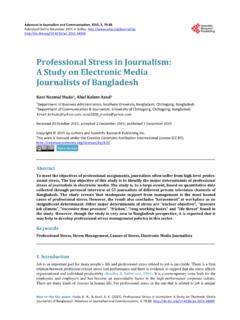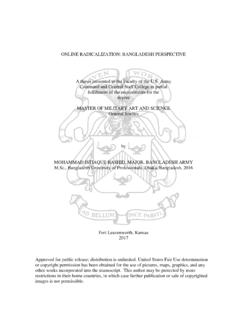Transcription of Professional online Online certificate course in ...
1 OverviewThe Red Cross Red Crescent Learning Network of the International Federation of Red Cross and Red Crescent Societies (IFRC), in partnership with the Tata Institute for Social Sciences (TISS) is proud to offer an affordable Professional Online introductory level course in disaster management . The course faculty is comprised of leading experts from around the world leveraging the decades of experience in disaster response, to enhance the knowledge and capacities of the Red Cross and Red Crescent staff and volunteers and humanitarian professionals, resulting in building sustainable and resilient communities and nations. It provides students with real life case studies from one of the world s largest social Online certificate course in Disaster ManagementCourse length: 12 months Online course fee: National Societies and IFRC (and TISS alumni) participants $990 USD.
2 Standard programme fee $1,980 received: certificate Diploma issued Audience: Red Cross and Red Crescent governance and senior leadership Red Cross and Red Crescent National staff and volunteers IFRC and ICRC staff Other humanitarian professionalsOnline certificate course Alanah Torralba/IFRCIn line with Strategic Aim 1 of Strategy 2020 the IFRC commits to Save lives, protect livelihoods, and strengthen recovery from disasters and crises. Disaster management is a trans-disciplinary field that aims to address existing practice-knowledge gaps by supporting professionals with the right blend of academic and practical approaches to reduce vulnerability and risks to hazards. Stakeholders in Disaster management include governments, international organisations, NGOs, the private sector and individuals. On completion of the course students will be able to show critical understanding of:1.
3 The range of vulnerabilities faced by the poorest and marginalized and the impact endured by them in the developing Key issues and debates related to disaster risk reduction, disaster response, and post-disaster All stages of disaster management such as pre-disaster preparedness and mitigation, rescue and relief in the context of disaster, and post disaster rehabilitation, reconstruction and recovery. Module 0 Learning to learn. non-creditThe participants will be oriented and introduced to the methodology of Online classrooms and the tools for communication and 0 World Of Red Cross. non-creditThis module introduces the participants to the world of the Red Cross. and the roles of its three main components, (i) International Committee of the Red Cross (ICRC), (ii) International Federation of Red Cross and Red Crescent Societies (IFRC) and, (iii) 189 members of the Red Cross and Red Crescent 1 Introduction to development.
4 2 creditsThe key objective of the course is to equip students to examine basic concepts related to development, including human development and sustainability, in order to understand disasters and meaningful sustainable response to them. Topics covered include Concepts and Approaches to Growth and Development from the Welfare State to Globalisation, Poverty and Inequality, Human development, Sustainable Development, Governance and 2 Humanitarian Principles, Laws and Standards in Disaster management . 2 creditsThis module covers the basic understanding of the following themes/key areas: (a) Fundamental humanitarian Principles, (b) International disaster response law (IDRL), (c) International Humanitarian law (IHL), (d) Humanitarian Charter, (e) Code of Conduct, (f) Articulating the history and evolution of humanitarianism and (g) Various facets of applying humanitarian standards in disaster context.
5 It provides a foundation by analysing these key issues and concepts and examines their interrelationship/ validity in 3 Introduction to Hazards, Vulnerabilities and Disasters. 4 creditsThis module aims to develop a conceptual understanding of hazard, exposure, risk, vulnerability and disaster. The course explains how vulnerability and hazard interact to create disasters. The contents include: Introduction to Risk and Vulnerability, Political, Social and Economic Perspectives of Risk and Vulnerability, Disasters Introduction, Definition and Characteristics, Contributing Factors, Differentiating between Disasters, Potential Impacts of Disasters, Approaches to Disaster Risk and Vulnerability Federation of Red Cross and Red Crescent SocietiesProfessional Online certificate course Disaster ManagementAbout the course Learning objectivesCourse details Modules 0 to 3 Module 4 Disaster Risk Reduction and Development Planning.
6 2 creditsThe objective of the module is to develop knowledge and a critical outlook on the different frameworks, approaches and methods for disaster prevention, preparedness and vulnerability reduction which include Conceptual Framework of Disaster Risk Reduction the Hyogo Framework for Action, DRR Measures (Assessment, Early Warning, Natural Resource management , Social and Economic Developmental Practices), DRR Planning, Hazard and Risk Reduction Strategies; Objectives of Disaster Risk Reduction, Understanding Resilience, Linking Vulnerability Reduction and Disaster Recovery. Module 5 Information Communication and Geo-informatics Technologies in Disaster management . 2 credits Information communication Technology (ICT) and Geo-informatics Technology (GIT) have been widely used in planning, mitigation, and response in the disaster situations. This module covers: Introduction to Information and Communication Technology (ICT) and Geo-Informatics Technology (GIT), Remote Sensing, Geographical Information Systems (GIS) and Application of GIT and 6 Disaster Response and Recovery.
7 4 credits Developing the understanding of the multiple stakeholders involved in disaster response and the standards of humanitarian aid, relief, rehabilitation and development. Topics covered include: Disaster management Plans, Key Response Functions including Public Health, Logistics and Governance, Recovery, Rehabilitation and 7 Term Paper Research and Analysis. 2 credits The Term paper requirement is designed to be a unique self-study course for participants to the Online certificate programme. The module is aimed at facilitating the engagement of course participants with quality research. The participants will be encouraged to work closely with a faculty member, who will guide them systematically in selecting and developing a research area,, use appropriate methods for data collection, and produce a paper with an analytical 8 Internship-Applied Knowledge/Practicum.
8 4 credits The Internship or Field Work in the certificate programme shall enable the participants to develop a broader national and international perspective on disaster management . The participants can choose their parent organization as a site for the internship or it may be based with organizations engaged with high quality research or practical work in the field of disaster risk Federation of Red Cross and Red Crescent SocietiesProfessional Online certificate course Disaster ManagementCourse details Modules 4 to 8 This Online course in disaster management is conducted entirely Online via the Tata Institute of Social Science (TISS). The course consists of 22 credits and is an Online distance learning programme where the participants study, complete the internship and term paper in their country. The course lasts for 12 months in total with each of the 8 modules.
9 The course has been designed to recreate a classroom learning environment via Online learning where reading materials and tools are provided for each module. The programme includes Online Professional course work together with supervised and graded field interns. Students will be able to engage fully with the programme content and with their peers, via lectures, discussion boards, group work, Online chat, question and answer sessions with the tutor and through the provision of peer to peer feedback and course will however require strong commitment from the participant and they are expected to devote approximately 8 10 hours Online per week for their S. Parasuraman is the Director of TISS and has over 25 years of experience as a teacher, trainer, activist, administrator and development worker. He has a strong foundation in critical thinking, and conceptual and analytical skills.
10 He has always liked to be part of a larger team and has the rare ability to work in a multi-cultural and multi-disciplinary team. Prof. Parasuraman enjoys working in challenging social, political and physical environments. Dr. Parasuraman has a Master s Degree in Anthropology from the University of Poona, Pune and a in Demography from the University of Mumbai, Mumbai. He has also been conferred Doctor of Literature (Honoris Causa) by the Assam University. He has held key positions in international organisations: as Asia Regional Policy Coordinator, ActionAid Asia; Senior Advisor to the Commission, and Team Leader of the Secretariat; World Commission on Dams; and as Programme Director, Oxfam GB, India Programme. Currently, he is Director, Tata Institute of Social Sciences, Mumbai, is currently Dean, School of Habitat Studies at the Tata Institute of Social Sciences.
